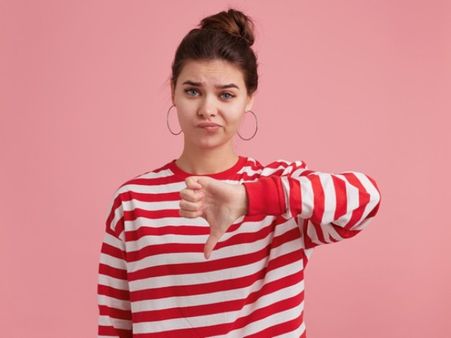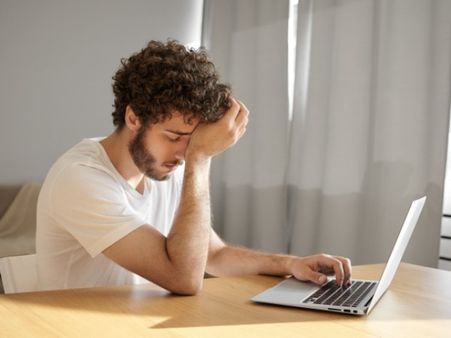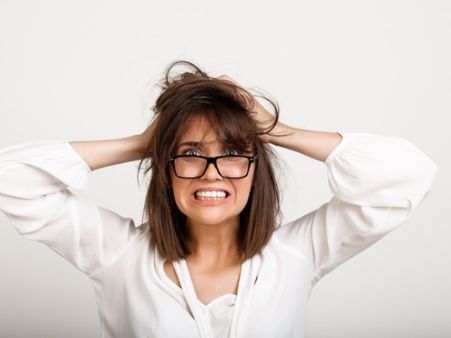Just In
- 2 hrs ago

- 3 hrs ago

- 4 hrs ago

- 12 hrs ago

Don't Miss
- Finance
 1:2 Stock Split, Dividend 100%, Net Soars 52.56%: Engineering Stock Soars 1576% In 3-Yrs
1:2 Stock Split, Dividend 100%, Net Soars 52.56%: Engineering Stock Soars 1576% In 3-Yrs - News
 Protests Erupt After 24-Year-Old Neha's Murder In BVB College Campus In Hubballi
Protests Erupt After 24-Year-Old Neha's Murder In BVB College Campus In Hubballi - Sports
 WWE Raw: Battle Royal announced to determine new Women’s World Champion
WWE Raw: Battle Royal announced to determine new Women’s World Champion - Movies
 Metro In Dino: When Ananya Panday Warns Sara Ali Khan Not To Touch Aditya Roy Kapur As She Pairs Up With Him
Metro In Dino: When Ananya Panday Warns Sara Ali Khan Not To Touch Aditya Roy Kapur As She Pairs Up With Him - Technology
 Garena Free Fire Max Redeem Codes for April 20, 2024: Get Access to the Latest In-game Loot
Garena Free Fire Max Redeem Codes for April 20, 2024: Get Access to the Latest In-game Loot - Automobiles
 Ford Mustang 60th Anniversary Package – Limited To Just 1,965 Units
Ford Mustang 60th Anniversary Package – Limited To Just 1,965 Units - Education
 Exam Pressure Does Not Exist; Studying Punctually is Crucial; Says Aditi, the PSEB 2024 Topper
Exam Pressure Does Not Exist; Studying Punctually is Crucial; Says Aditi, the PSEB 2024 Topper - Travel
 Journey From Delhi To Ooty: Top Transport Options And Attractions
Journey From Delhi To Ooty: Top Transport Options And Attractions
Kakorrhaphiophobia In Bhumi Pednekar's Durgamati: What Is The Condition And Can It Be Treated?
The Bhumi Pednekar starrer Durgamati, which was released last week on OTT platforms has received the attention of the audience, not for the unsurprising jump cuts or the seemingly clueless storyline, but for a term used by a psychiatrist to solemnly justify the actions of the central character.

The term - Kakorrhaphiophobia, the meaning - fear of failure; is viewed as the 'issue' with Chanchal, an IAS officer who seems to be possessed. While we will not be going into the not-so-fresh theme or the predictable storyline of the movie, this article will be exploring Kakorrhaphiophobia.

What Is Kakorrhaphiophobia?
Kakorrhaphiophobia is the term used to define the abnormal, persistent, irrational fear of failure [1]. It is understood as the most extreme version of doubt, uncertainty, anxiety about our capabilities, and fear of what others will think and is common. Those exhibiting this phobia may suffer from very low self-esteem and may find themselves to be very anxious.

This persistent fear of failure can restrict an individual, refraining themselves from doing anything at all. The level of fear varies from one person to the other. People with kakorrhaphiophobia may overtly recognise their own shortcomings and disadvantages in life.

What Causes Kakorrhaphiophobia?
Kakorrhaphiophobia has its roots in childhood and develops as a result of punishments and demeaning one faces from an authoritative figure when one fails to perform any task. This inherent fear or infliction tend to grow as the person grows up, with more reasons to doubt one's abilities to succeed [2]. Growing up in an environment where you were greatly pressured to achieve things and set goals could possibly have had a negative effect on any individual.
Social pressure, peer pressure, educational and occupational stress can all contribute towards the development/worsening of kakorrhaphiophobia or fear of failure in an individual. The constant fear of failing can develop the need to prove oneself constantly through external actions. At the same time, the same fear can stop you from pursuing risks, thus damaging your esteem further [3].

What Are The Symptoms Of Kakorrhaphiophobia?
Clinically, there are no specific symptoms associated with this condition. But the following are some of the symptoms or actions people with an extreme fear of failure have shown, according to health experts [4][5]:
- Constantly and pessimistically predicts the results of their actions
- Fear or lack of interest in doing simple tasks such as shopping, due to the fear of not being able to drive properly or hail a cab
- Coming up with several excuses to justify their fear
- Pursues things that are easy
- Fear accompanied by panic and anxiety attacks, nausea and vomiting
- Sweating
- Dry mouth
- Trembling
- Increased blood pressure
- May also exhibit atelophobia (fear of imperfection)
- Regretful and hesitant

What Is The Treatment For Kakorrhaphiophobia?
There are no specific treatments for kakorrhaphiophobia. Doctors and psychologists prescribe cognitive behavioural therapy (CBT), exposure therapy, and anti-anxiety medication, which may help reduce the symptoms associated with the condition [6].
Anti-anxiety medications may help reduce the anxiety levels and help you perceive things more strongly, thereby opening yourself up to new things that can be benefitting.
Studies point out that exercise has been shown to be extremely beneficial for people suffering from kakorrhaphiophobia [7]. Cardiovascular exercises can help manage the anxiety levels and aerobic exercises can help release the feel-good chemicals in the brain, such as endorphins.

In addition to this, experts point out that exercise can help condition the mind to better cope with stressful situations, and in this case, help reduce the symptoms of kakorrhaphiophobia by making it much easier for to cope with the associated anxiety and stress.
Some of the exercises/physical activities that have been proven beneficial for people with this condition are as follows [8]:
- Swimming
- Biking
- Skiing
- Walking
- Jogging
- Playing sports such as tennis, soccer, basketball, and racquetball
Avoid caffeine for kakorrhaphiophobia: Consuming large amounts of caffeine throughout the day can elevate one's anxiety levels. Therefore, consuming little to no caffeine throughout the day may be able to significantly help reduce your day-to-day anxiety and symptoms associated with kakorrhaphiophobia.

On A Final Note…
If you think you may have kakorrhaphiophobia, talk to your doctor or make an appointment with a psychologist to know more about what is stopping you from living your life.
-
 bollywood wardrobeBhumi Pednekar’s Stunning And Delicate Ivory Lehenga Makes For A Perfect Bridesmaid Outfit
bollywood wardrobeBhumi Pednekar’s Stunning And Delicate Ivory Lehenga Makes For A Perfect Bridesmaid Outfit -
 bollywood wardrobeBhumi Pednekar Looks Office-Ready As She Exudes Boss Lady Vibes In Her Formal Black Suit And Classy Handbag
bollywood wardrobeBhumi Pednekar Looks Office-Ready As She Exudes Boss Lady Vibes In Her Formal Black Suit And Classy Handbag -
 make up tipsDurgamati Promotions: Bhumi Pednekar’s Purple Eyeshadow Is A Chic Makeup Choice For Weekend Parties
make up tipsDurgamati Promotions: Bhumi Pednekar’s Purple Eyeshadow Is A Chic Makeup Choice For Weekend Parties -
 make up tipsDurgamati Promotions: Bhumi Pednekar Is A Beauty In Metallic Pink Eye Shadow And Pink Lipstick
make up tipsDurgamati Promotions: Bhumi Pednekar Is A Beauty In Metallic Pink Eye Shadow And Pink Lipstick -
 bollywood wardrobeDurgamati Promotions: Bhumi Pednekar Blossoms In A Wedding-Perfect Pink Floral Lehenga
bollywood wardrobeDurgamati Promotions: Bhumi Pednekar Blossoms In A Wedding-Perfect Pink Floral Lehenga -
 make up tipsDurgamati Promotions: Bhumi Pednekar Sports Minimal Make-Up But Her Blue Winged Eyeliner Steals The Attention
make up tipsDurgamati Promotions: Bhumi Pednekar Sports Minimal Make-Up But Her Blue Winged Eyeliner Steals The Attention -
 beautyBhumi Pednekar Skincare Secrets: 5 Things To Know!
beautyBhumi Pednekar Skincare Secrets: 5 Things To Know! -
 bollywood wardrobeRajkummar Rao, Rakul Preet Singh, Suhana Khan, And Others Raise Glam Quotient At Bhumi Pednekar’s Diwali Bash
bollywood wardrobeRajkummar Rao, Rakul Preet Singh, Suhana Khan, And Others Raise Glam Quotient At Bhumi Pednekar’s Diwali Bash -
 bollywood wardrobeYour Traditional Outfits Sorted Ft. Mahima Makwana, Bhumi Pednekar, And Chitrangda Singh
bollywood wardrobeYour Traditional Outfits Sorted Ft. Mahima Makwana, Bhumi Pednekar, And Chitrangda Singh -
 bollywood wardrobeAlia Bhatt, Athiya Shetty And Other Divas In Their Resplendent Best At Anushka Ranjan’s Sangeet
bollywood wardrobeAlia Bhatt, Athiya Shetty And Other Divas In Their Resplendent Best At Anushka Ranjan’s Sangeet -
 bollywood wardrobeBhumi Pednekar Looks Gorgeous In Her Floral Dress; You Can Buy This Dress For Less Than Rs. 6000
bollywood wardrobeBhumi Pednekar Looks Gorgeous In Her Floral Dress; You Can Buy This Dress For Less Than Rs. 6000 -
 bollywood wardrobeAirport Fashion: Janhvi Kapoor, Katrina Kaif, And Other Actresses Show Us How To Look Comfortably Chic
bollywood wardrobeAirport Fashion: Janhvi Kapoor, Katrina Kaif, And Other Actresses Show Us How To Look Comfortably Chic


 Click it and Unblock the Notifications
Click it and Unblock the Notifications




